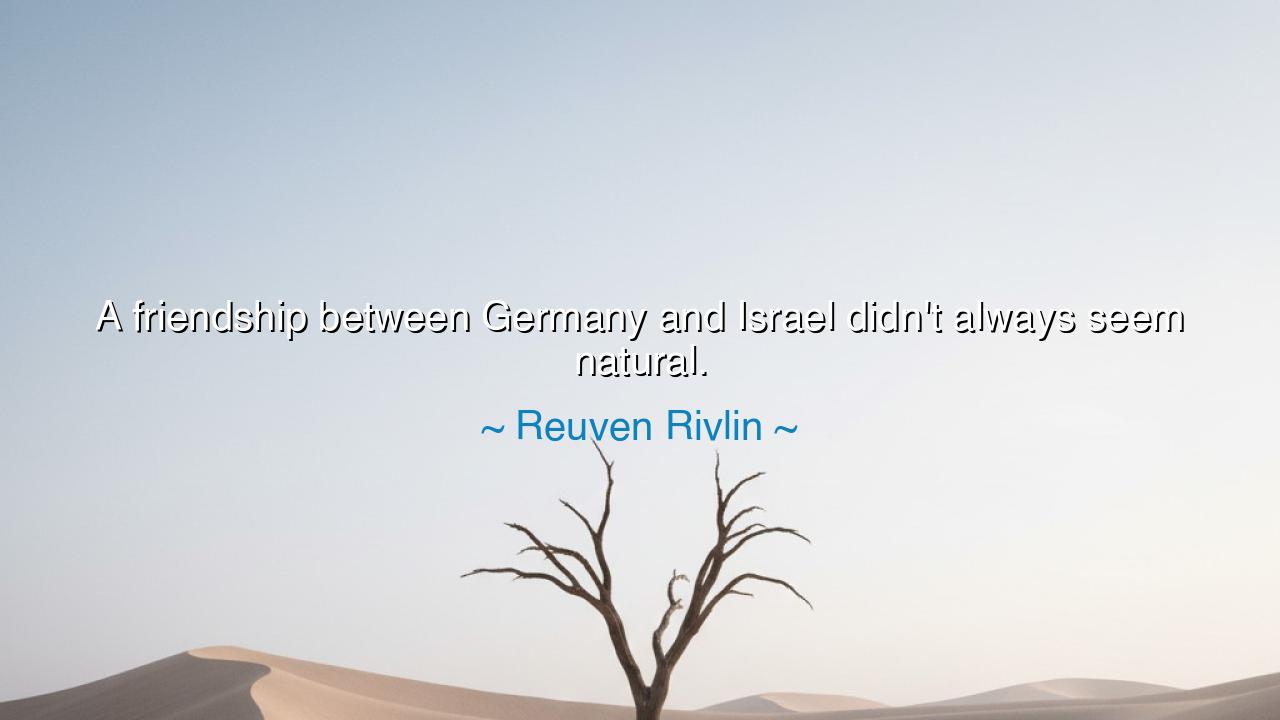
A friendship between Germany and Israel didn't always seem






“A friendship between Germany and Israel didn’t always seem natural.” — in these few but powerful words, Reuven Rivlin, former President of Israel, speaks of one of history’s most profound transformations: the journey from hatred to reconciliation, from ashes to friendship. His reflection is not merely political; it is deeply human, a testament to the capacity of nations — and indeed of the human heart — to rise beyond grief, guilt, and fear. For between Germany and Israel lies not only a line on the map, but a chasm carved by tragedy — the dark memory of the Holocaust, where millions of Jewish souls were extinguished under the hand of tyranny. And yet, from that abyss, something unexpected was born: the courage to forgive, and the wisdom to build anew.
When Rivlin says that such friendship “didn’t always seem natural,” he reminds us that there was a time when such a bond would have been unthinkable. In the years following the Second World War, the people of Israel carried wounds too deep for easy healing. Germany, burdened with the guilt of its own deeds, seemed an eternal stranger, a nation whose very name evoked pain. Yet history, guided by the steadfast work of those who believed in redemption, began to turn. Out of remorse came dialogue; out of dialogue, respect; and out of respect, the fragile bloom of friendship that no one could have foreseen.
It was 1952, when David Ben-Gurion, Israel’s first Prime Minister, made the courageous decision to accept reparations from West Germany — not as blood money, but as the first gesture of responsibility. The world was divided over it; survivors wept in fury, unable to forgive. Yet Ben-Gurion looked beyond vengeance, believing that if justice could not erase the past, perhaps cooperation could redeem the future. Through years of patient effort, ties grew — at first political, then cultural, then human. In classrooms, young Germans studied the truth of their history, while Israelis began to see a new generation that sought understanding rather than denial. Thus, step by step, a bridge was built — not of convenience, but of moral courage.
This friendship — unnatural at first, as Rivlin confesses — became one of the most remarkable alliances of the modern world. From the horror of the Holocaust emerged not hatred renewed, but empathy reborn. Germany, now a guardian of remembrance and tolerance, became one of Israel’s strongest supporters, and Israel, in turn, extended its hand to a people who had faced their past with humility. In this transformation lies one of the greatest lessons of civilization: that reconciliation is not weakness, but the highest form of strength.
Such transformations are not confined to nations. They are reflections of what every human soul must learn — that even where pain has built its fortress, forgiveness can lay the foundation for peace. Just as Germany and Israel rose from their shared history of darkness, so too can individuals transcend betrayal, anger, and division. The act of forgiving does not erase the past; it redeems it. It declares that the past shall not chain the future.
To the generations that follow, remember this truth: friendship born from struggle is stronger than friendship born from ease. It is forged in the fire of understanding, shaped by empathy, and cooled by time. If such nations — once bound by blood and horror — could find a way to walk side by side, then surely the rifts among families, peoples, and hearts can also be healed. Let this story be not one of politics, but of humanity’s enduring power to transform suffering into wisdom.
Take action in your own life as these nations did: when wronged, choose not the sword, but the dialogue; when haunted by pain, let remembrance be your guide, not your prison. Seek not to forget, but to forgive, for forgiveness does not mean surrender — it means mastery of the soul. Build bridges where once there were ruins, and honor the past not with vengeance, but with understanding.
Thus, in Rivlin’s humble reflection, the wisdom of the ancients speaks again: that no enmity is eternal, no wound beyond healing, no darkness beyond light. A friendship between Germany and Israel may not have seemed natural — but it became possible through the courage to face the truth, and the grace to rebuild upon it. In that truth lies a message for all time: that even the deepest divides can be crossed, if the heart dares to hope, and the spirit chooses peace over pain.






AAdministratorAdministrator
Welcome, honored guests. Please leave a comment, we will respond soon